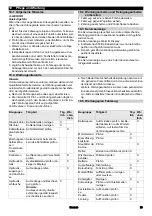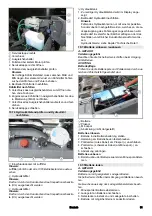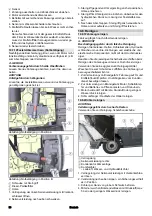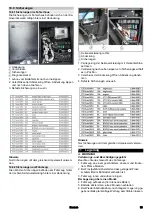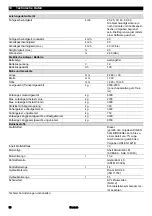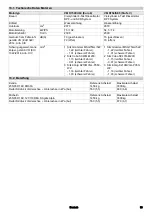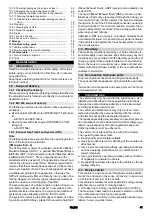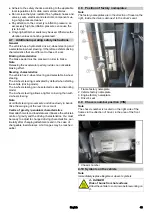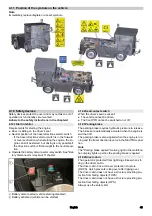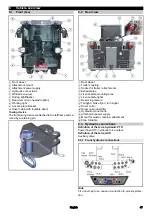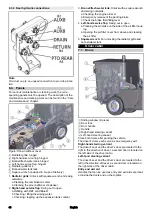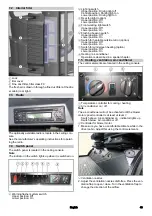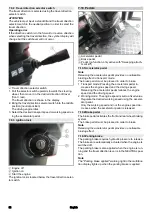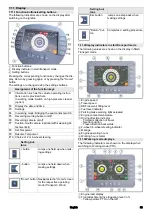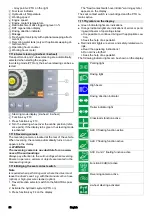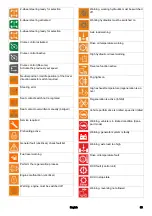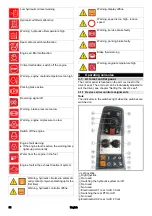
English
41
1
General notes
1.1
Introduction
Read the original instructions and the safety instructions
before using your vehicle for the first time. Act in accord-
ance with them.
Keep these operating instructions for future reference or
for future owners.
1.2
Scope of delivery
1.2.1 Checking the delivery
Please report any defects or shipping damage identified on
the vehicle when it is handed over directly to your dealer or
department store.
1.2.2 MC 250 scope of delivery
The following vehicles are described in these operating in-
structions:
●
Device carrier with VM motor (R754EU6C) 75 kW (Euro
6)
–
with DPF and SCR filters
●
Device carrier with VM engine (R754ISE5) 54.5 kW
(Stage V)
–
with DPF filter
1.2.3 Exhaust Gas Treatment System (ATS)
Note
The following texts are excerpts from the operating instruc-
tions of the engine manufacturer.
(VM engine Euro 6)
The ATS system consists of a catalytic converter "
D
iesel
O
xidation
C
atalyst (DOC) ", a particle filter"
D
iesel
P
articu-
late
F
ilter (DPF) "and a catalytic converter"
S
elective
C
ata-
lyst
R
eduction (SCR) ". These components burn the
collected particles as part of a "regeneration process" and
reduce the nitrogen oxides (NOx). Effective regeneration
requires that the exhaust gases escape at a high temper-
ature over a period of time. The exhaust gases must have
a suitable temperature for regeneration, otherwise the
DPF will continuously filter and thereby incurs a risk of be-
coming clogged. An actively regenerated post-treatment
system is used to avoid clogging of the filter.
The exhaust gases of a diesel engine contain nitrogen ox-
ides (NOx), which must be reduced. In accordance with
pollutant emission standards, the current post-treatment
system has been integrated with an "SCR" system.
The system for reducing the NOx gases consists of a dos-
ing control unit (DCU Box), a tank for the reaction fluid DEF
(Diesel Exhaust Fluid), a DEF injector and a catalytic con-
verter SCR.
The liquid "
D
iesel
E
xhaust
F
luid "(DEF) or known as Ad-
Blue® as a trade name is pumped through the dosing con-
trol unit (DCU box) into the injector. The injector atomizes
the liquid in front of the SCR catalytic converter, causing a
chemical reaction. This chemical reaction converts the ni-
trogen oxides (NOx) contained in the exhaust gases into
water vapour and nitrogen.
AdBlue® or DEF is a non-toxic, colourless, odourless and
non-flammable liquid. It is poured into a special container
in the vehicle and injected into the exhaust system to clean
the exhaust gases.
1.3
Warranty
The warranty conditions issued by our sales company re-
sponsible apply in all countries. We shall remedy any mal-
functions on your vehicle within the warranty period free of
charge, provided that a material defect or manufacturing
flaw is the cause. In a warranty case, please contact your
dealer (with the purchase receipt) or the next authorised
customer service site.
1.4
Accessories and spare parts
Only use original accessories and original spare parts.
They ensure that the appliance will run fault-free and safe-
ly.
Information on accessories and spare parts can be found
at
www.kaercher.com
.
2
Intended use
The vehicle may only be used for the intended use, as il-
lustrated and described in these operating instructions.
Intended use also includes adherence to the prescribed
servicing activities and intervals.
The vehicle and attachments may only be used, main-
tained and repaired by persons familiar with the vehicle
and attachments and the associated hazards.
The legally applicable general safety and accident preven-
tion regulations must be adhered to. All other safety regu-
lations, occupational health care regulations and road
traffic regulations must be adhered to.
The vehicle is not intended for use with a front loader.
The operating personnel must:
●
Be physically and mentally suitable
●
Have been instructed in the handling of the vehicle and
attachments
●
Have read and understood these operating instructions
and the operating instructions for any attachments or
towed machinery
●
Have provided the operating company with verification
of capability to operate the vehicle
●
Be explicitly nominated to operate the vehicle by the op-
erating company
2.1
Device carrier
This vehicle is a device carrier that allows various attach-
ments (not included in the scope of delivery) to be mount-
ed at the front and rear of the vehicle.
This vehicle is suitable for work applications using various
attachments, as well as for towing trailers.
●
Unbraked up to 600 kg, inertia-braked up to 3000 kg
The maximum trailer load to be towed is stated on the fac-
tory nameplate and must not be exceeded.
The vehicle must conform to the applicable national regu-
lations if used on public roads.
10.7.8 Checking/topping up the engine oil level ...............
10.7.9 Changing the engine oil/engine oil filter .................
10.7.10 Checking the brake fluid level in the reservoir .....
10.7.11 Draining the water separator................................
10.7.12 Releasing the parking brake (emergency opera-
tion)......................................................................
10.8 Cleaning....................................................................
10.8.1 Cleaning the vehicle ..............................................
10.8.2 Clean the radiator ..................................................
10.9 Fuses ........................................................................
10.9.1 Fuses in the cab ....................................................
10.9.2 Fuses on the vehicle..............................................
11 Storage........................................................................
12 Troubleshooting guide ..............................................
12.1 Vehicle malfunctions .................................................
12.2 Error messages for symbol displays .........................
13 Technical data ............................................................
13.1 Technical data of engines .........................................
13.2 Tyres .........................................................................
Summary of Contents for MC 250
Page 2: ......



